Letters
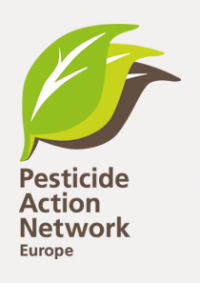
The Farm to Fork Strategy’s objectives on pesticides reduction cannot be achieved without a strong implementation of the substitution principle
Dear Commissioner Kyriakides,

Pesticide Action Network Europe’s reaction to COPA-COGECA attack on the overall pesticide use reduction targets in the biodiversity strategy
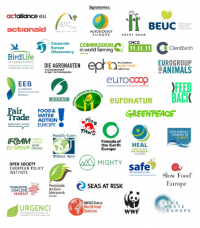
CSOs open letter on the importance and urgency of publishing the Farm to Fork strategy: no further delays, keep April 2020 as publication date
To:
Executive Vice-President Frans Timmermans
Commissioner Stella Kyriakides
Commissioner Janusz Wojciechowski
Commissioner Virginijus Sinkevičius
CC: Anne Bucher, Director-General of DG SANTE (Health & Food Safety); Wolfgang Burtscher, Director-General of DG AGRI (Agriculture & Rural Development);
Daniel Calleja Crespo, Director-General of DG ENVI (Environment); Mr Bernhard Friess acting Director General for DG MARE (Maritime Affairs and Fisheries)
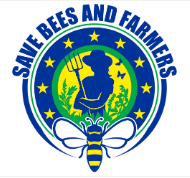
European Green Deal needs to cut pesticides and switch to agroecology
Brussels, 31 March 2020
EU civil society letter to Commission Vice President Timmermans, Commissioners Kyriakides, Wojciechowski and Sinkevičius

Comments on the Committee on Food Security’s Zero Draft Policy Recommendations on Agroecological and Other Innovative Approaches for Sustainable Food Systems that Ensure Food Security and Nutrition

The fight against COVID-19: let’s make public investments count for people
On 25th March 2020, 61 organisations including patients, consumers, healthcare professionals, trade unions and public interest organisations published a letter to express our views on the importance of the role of public support to research and development during the current pandemic.
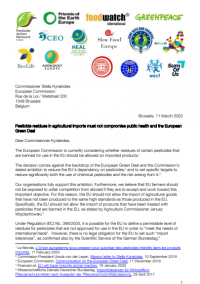
Pesticide residues in agricultural imports must not compromise public health and the European Green Deal
Brussels, 11 March 2020
Dear Commissioner Kyriakides,
The European Commission is currently considering whether residues of certain pesticides that are banned for use in the EU should be allowed on imported products.1
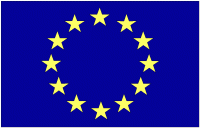
Open Letter to Health Commissioner Kyriakides: Fraud at GLP-certified laboratories
Brussels 04/03/2020
Open Letter: Fraud at GLP-certified laboratories
Dear Commissioner Kyriakides,
We are writing to you on behalf of the coalition “Citizens for Science in Pesticide Regulation”, a European initiative consisting of over 140 European and international civil society organisations and institutions. The coalition is calling on regulators to improve the current risk assessment procedure and ensure that pesticides used in Europe pose no threat to human health and the environment.
